In recent weeks, protests in the historical antique district of Snohomish, Washington, turned contentious after peaceful protestors were met by counter-protestors, many armed. Like other protests around the Puget Sound region, across the country, and throughout the world, these local protests were held after the recent death of George Floyd and others who have been murdered by police brutality. These crimes against the Black and African American Community have further incited a call for police reform and closer attention to the Black Lives Matter movement for justice and equal opportunities, equal respect, and equal treatment. Michael and Jennifer Adams, residents of nearby Granite Falls, Washington, decided they wanted to help change the narrative, this time with a peaceful and silent march.
Michael Adams and other community members also recently created the Facebook group Change the Narrative: Granite Falls, which was established with the mission to, “…encourage positive conversation, enlightened education, and the opportunity to choose to change your perspective on social injustice, racial inequality, police biases, criminal justice reform, and the many layers of topics that stem from systemic racism.” This community page also recognises that, “Unfortunately, people of color still face discrimination here in Granite Falls and are not being treated with the respect and dignity they deserve. There are many processes that can be used to keep people of color from being treated justly and as equals. Refusal to recognize the problem is the easiest way to avoid the reality of the racial divide. This group is formed to change the narrative of the conversation on equality in Granite Falls, WA and beyond.”
Change the Narrative: Granite Falls, which currently has 310 members, has quickly gained momentum in supporting open dialogue within the Granite Falls community and beyond. It also serves as an example for a discussion forum that can be adopted in other communities from small towns like Granite Falls to larger cities. With a long-standing narrative of a lack of diversity and racism in Granite Falls, Change the Narrative is helping set a new standard for the community and, indeed, change the narrative.
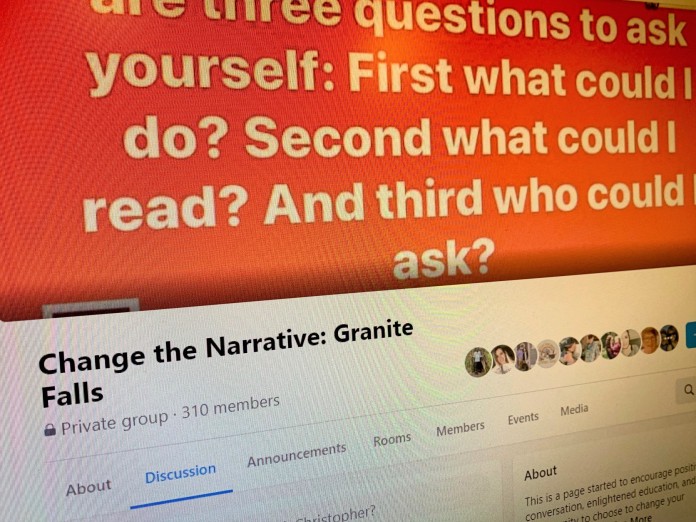
On June 19th, 2020 (also known as Juneteenth), Michael and Jennifer Adams hosted the March on Snohomish/Sign Wave: Gathering of Peace starting at the Kla Ha Ya Park on 1st Street in Snohomish, Washington. Before the march began down 1st Street towards Union Street, passing City Hall, those who had assembled for the march had the opportunity to hear various experiences, perspectives, and stories from Mr. Adams, Snohomish Mayor John Kartak, State Representative of the 44th Legislative District, John Lovick, and Captain Robert D. Palmer who is currently serving as Interim Chief of Police.
First, Mayor Kartak shared his thoughts. Among them, he acknowledged that, “there is a lot of pain that continues to this day,” and that we need to, “ask bold questions and speak bold truths. Truth is a fire.”
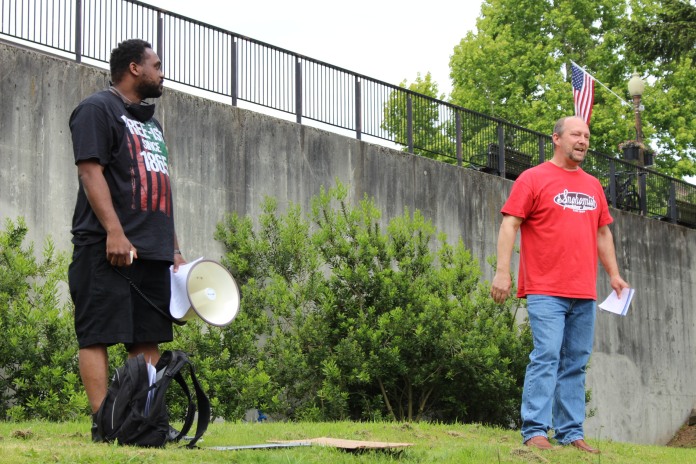
After recent unrest at other protests, Mayor Kartak has been criticised—even facing pressure to resign—for failing to do more to address racism in Snohomish. Unrest has included the presence of heavily-armed, self-appointed ‘guards’ with assault-style rifles, brawls in the streets, protestors being punched, waving of the Confederate flag, and the use of profanity and shouts of “all lives matter” in response to protestors chanting “Black Lives Matter.” Local law enforcement was made aware of threats of possible looting, but none of this materialised. At the Juneteeth march, there were still some windows of shops boarded up as a precaution.
Next, State Representative, John Lovick, spoke. He began by giving us some background on his life. Born and raised in Louisiana, Mr. Lovick met his great-great-grandfather, Thomas Holden, in the 1960s, who was a slave when he was born. Mr. Holden died in 1965 at the remarkable age of 103. “Even though he did not die a slave,” said Mr. Lovick, “he was still somewhat treated like a slave.” Mr. Lovick then shared his feelings on how Juneteenth should be celebrated:
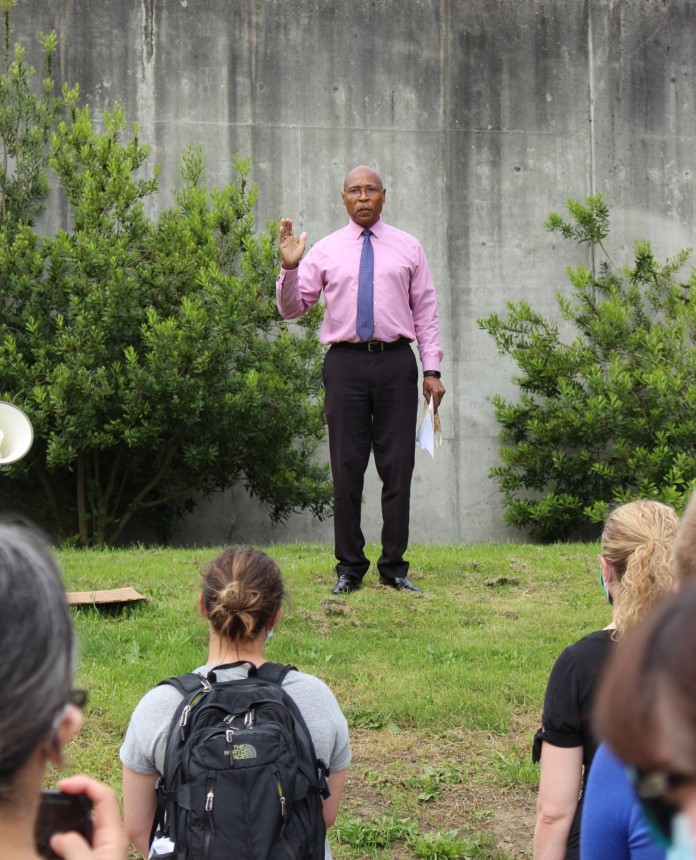
In Snohomish and in the State of Washington, this is how we can celebrate Juneteenth in the future:
We should celebrate Juneteenth with both an epidemic and a quarantine. (:laughter from the crowd:) And I mean this sincerely. Now, I know you’re laughing, but we should celebrate it with an epidemic and a quarantine. We should celebrate it with an epidemic of love, compassion, kindness, and understanding.
And then we’ll turn to the quarantine: we should quarantine the racists; quarantine the hate-mongers; quarantine the sexists; quarantine the homophobes. The bottom line is we need to call them in instead of calling them out.
We need a country, we need a world, we need a community where we can all live in harmony. And I gotta tell you something: I am so proud beyond words that I see what the young people are doing right now. […] I always used to look at these youngers and say, ‘You know what, you guys are our future.’ Man, was I wrong. I said, ‘You guys are the leaders of the future.’ They are leaders of now. And what they’re telling us is this: We better lead, follow, or get out of their way because they’re comin’.
Next, Captain Palmer gave a statement, a part of which is transcribed below. Captain Palmer is currently serving as the Interim Chief of Police in place of former Police Chief Keith Rogers, who has been reassigned within the Snohomish County Sheriff’s Office. Keith Rogers faced intense criticism over handling of rumoured activists’ plans to riot, and blatant disregard for armed vigilantes who clashed with peaceful protestors.
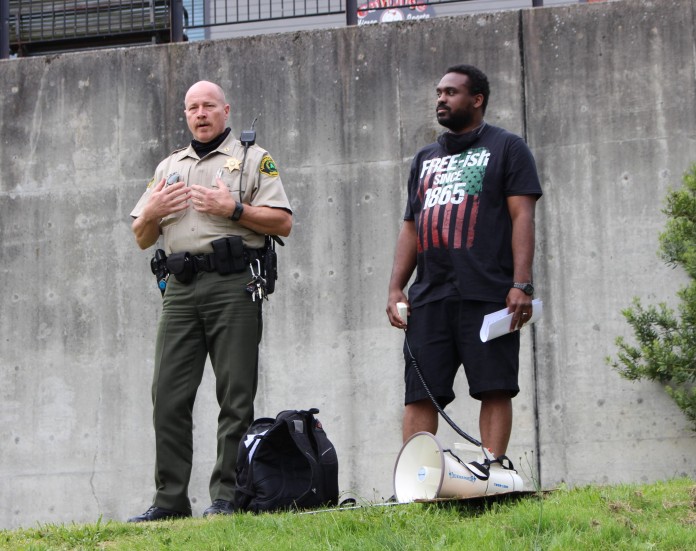
Simply, Black lives matter. We are here to protect everybody’s right […]. I just want to make sure that you guys have a chance to be heard, safely. This isn’t a huge group, but we’re prepared to close the roads if the crowd gets large and make sure there’s no cars coming in and out and getting in your way.
We’ve done this a lot and absolutely believe in everybody’s unalienable right to protest, peaceably assemble, and speak out against racial injustice.
I hate racism; I am against it completely; I’ve seen it; I’ve been affected by it; and I will not tolerate it. It will not happen on my watch in this county.
After overwhelming media attention to police brutality, we have seen and been bombarded by repeated crimes against Blacks and African Americans that can obscure our approval of and perspective on the entire institution of policing. Though reform and attention to systemic bias within the police force is unquestionably urgent, it’s important to remember that many of those in law enforcement do acknowledge and uphold their duty to protect the rights and safety of others. To have Captain Palmer speak and see several other officers assist us in our peaceful demonstration (as have other law enforcement officials in other marches and protests), it served as a reminder that law enforcement cannot be broadly judged and renounced for the misconduct of some.
Before beginning the march, we heard Mr. Adams deliver his speech:
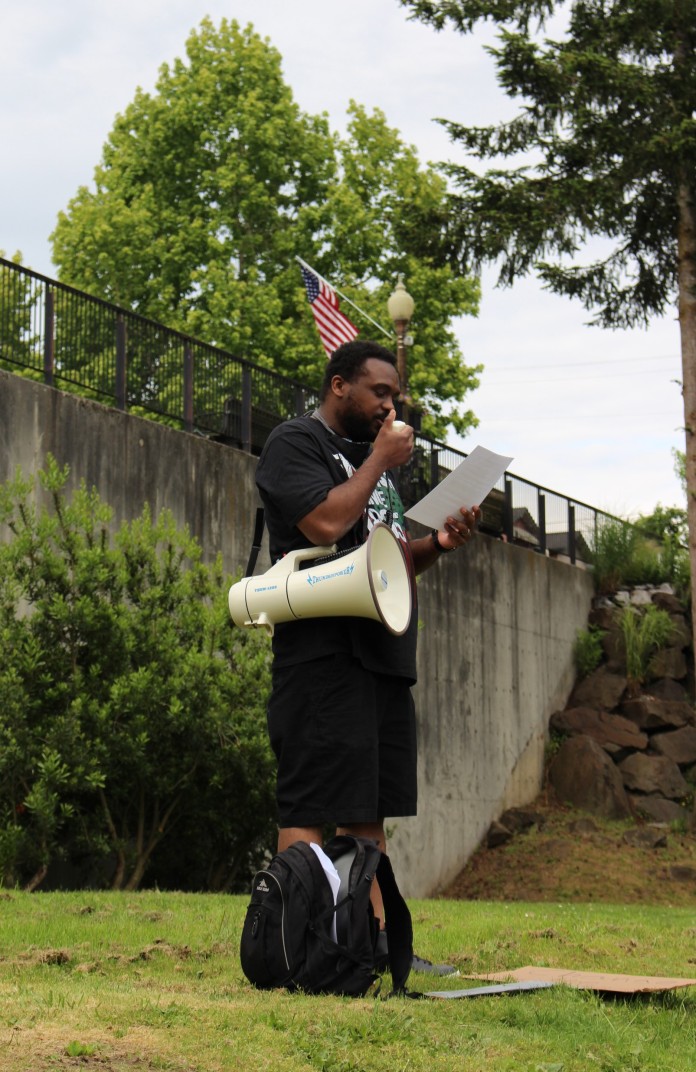
How Did We Get Here? Let’s Look at History to See the Missed Opportunity…
Prior to the Civil War, free blacks of the north were given a Certificate of Freedom to prove they were free.
They were subject to search at any time. If found to be without it, they could be jailed.
If jailed, they were responsible for paying for the cost of incarceration or they could be sold back into slavery.
April 12th, 1861—The Civil War begins. We learn in school that the Union was anti-slavery and assume all Blacks were free within it.
We learn that Southern states seceded to form the Confederate States of America, and they were pro-slavery. But they forget to teach us that there were four slave states that didn’t leave the union. In America, slavery was still legal.
April 16th, 1862—President Lincoln signs the D.C. Emancipation Act which frees slaves in the District of Columbia. ‘The Act provided for immediate emancipation, compensation to loyal Unionist masters of up to $300 for each slave, and voluntary colonization of former slaves outside the United States.’
Slave owners were paid to set their slaves free and some were paid up to $1,500 to do so. Even in the moment of being granted freedom, these newly freed people were treated as property because their freedom was bought, not given as a right.
What was voluntary colonization for former slaves outside the United States? Slaves were freed and asked if they wanted to leave America.
Newly freed Blacks from D.C. fled because of fear they would be sent back to Africa.
September 22nd, 1862—The Emancipation Proclamation was ordered by President Lincoln. The Proclamation declared ‘that all persons held as slaves’ within the rebellious states ‘are, and henceforward shall be free.’ It also gave Blacks the right to fight in the union army.
How can you order slaves to be free in D.C. but not the rest of the Union? How can you order slaves to be free in the Confederate States but not the Union? Simply put, Blacks at that time were ‘free-ish’.
December 6th, 1865—The abolishment of slavery comes through as the 13th Amendment. Slavery was ended in America at this time officially. It declared that ‘Neither slavery nor involuntary servitude, except as a punishment for crime whereof the party shall have been duly convicted, shall exist within the United States, or any place subject to their jurisdiction.’
June 19th, 1865—Juneteenth, the day where the last slaves of Texas and the former Confederacy were delivered the news of the Emancipation Proclamation. The Generals order reads as follows:
‘The people of Texas are informed that, in accordance with a proclamation from the Executive of the United States, all slaves are free. This involves an absolute equality of personal rights and rights of property between former masters and slaves, and the connection heretofore existing between them becomes that between employer and hired labor. The freed men are advised to remain quietly at their present homes and work for wages. They are informed that they will not be allowed to collect at military posts and that they will not be supported in idleness either there or elsewhere.’ —General Orders, Number 3; Headquarters District of Texas, Galveston, June 19, 1865.
We then move into the Jim Crow law era where laws were created to oppress people of color. During this time, punishment for crimes was used as a tool to put Blacks into prison, among other things.
There are countless cases where Blacks were wrongly convicted or given harsher sentences than white counterparts. Jim Crow Laws were unfair in many ways. They were abolished in legal form. But we still see the ideology behind it playing out in racial biases today.
The Jim Crow era gave life to the Civil Rights Movement, which truly began, in essence, even before the Civil War. The push for equality was always there. We all give so much credit to one of the leaders Dr. Martin Luther King, Jr.
Dr. King had a dream just like Langston Hughes, Frederick Douglass and many others before him. His dream was included in one of the world’s most famous speeches today. Yet we still have not achieved the dream in America that he and others shared.
All of these dates of significance show missed opportunity for Blacks to be treated equally and fairly.
The narrative taught in our education system to the history of the war is misleading. It isn’t just simply that the war was fought over slavery.
The Civil Rights movement is highlighted but the wrongdoing of the Jim Crow Era is quickly glossed over.
Ask yourself, why do we not openly discuss these things? Ask yourself, how did we make it this far with covering the truth?
What role do you play in increasing your own knowledge and that of others? Do you impede progress or are you taking action?
American History shows missed opportunity for change over and over again. While we may not be repeating history of slavery and Jim Crow laws violating civil rights. We are allowing systemic racism and social inequality to exists when we refuse to address it as a country together.
Juneteenth was created as a holiday for us to gather for lost family members, measure the progress of freedom, and to teach the rising generations the value of self-improvement and racial uplift.
Let’s make the most of this opportunity by accepting responsibility and taking action for the role we all play in making the dream a reality.
What is Juneteenth?
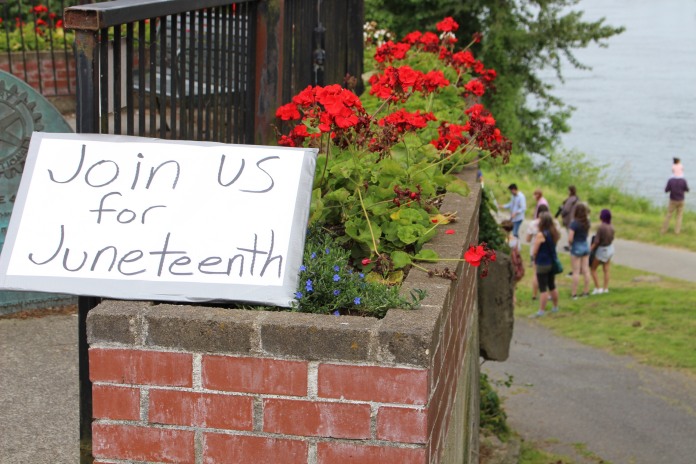
Juneteenth, dating to June 19, 1865, is an important celebration that might have been heard of but not widely recognised or understood until recently. It certainly was not at the forefront of my knowledge and I do not recall it being taught in school apart from Lincoln’s Emancipation Proclamation, dated January 1, 1863. Falling into the monotonous and unfortunate dates-names-places model of teaching history, this early education did not dive deeper into the significance of the observance or how it commemorates the official liberation of slaves after varying degrees of enforcement of the Emancipation Proclamation left many slaves unaware of the freedom they had been granted. They were ‘free-ish’ because they wouldn’t become aware of their freedom until two and a half years after the Emancipation Proclamation.
Per Wikipedia, “Juneteenth (a portmanteau of June and nineteenth)[2] – also known as Freedom Day,[3] Jubilee Day,[4] Liberation Day,[5] and Emancipation Day[6] – is a holiday celebrating the emancipation of those who had been enslaved in the United States. Originating in Texas, it is now celebrated annually on the 19th of June throughout the United States, with varying official recognition. Specifically, it commemorates Union army general Gordon Granger announcing federal orders in Galveston, Texas, on June 19, 1865, proclaiming that all slaves in Texas were free. [7] ”
Juneteenth.com details the two and a half year delay as follows: “Later attempts to explain this two and a half year delay in the receipt of this important news have yielded several versions that have been handed down through the years. Often told is the story of a messenger who was murdered on his way to Texas with the news of freedom. Another is that the news was deliberately withheld by the enslavers to maintain the labor force on the plantations. And still another is that federal troops actually waited for the slave owners to reap the benefits of one last cotton harvest before going to Texas to enforce the Emancipation Proclamation. All of which, or none of these versions could be true. Certainly, for some, President Lincoln’s authority over the rebellious states was in question. Whatever the reasons, conditions in Texas remained status quo well beyond what was statutory.”
* * *
As our march merged with an organised protest at Snohomish High School, we heard students, teachers, and local representatives share their personal stories and speeches. Among these, one student called for Mayor Kartak to be held more accountable for inaction to address racism, while looking directly at him in the crowd. Many stories were shared experiences of what it’s like to live-while-Black every day and at all ages: struggles for equal opportunity, micro-aggressions, the unspoken pressure to ‘look’ and ‘act’ white in order to fit in, false assumptions, and the anxieties of living a normal everyday life while feeling the constant surveillance of white people.
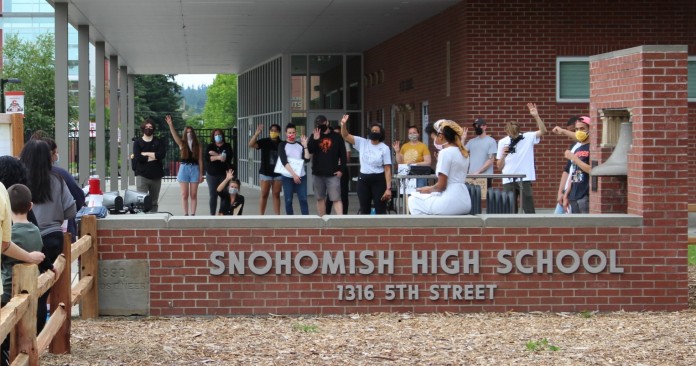
Continuing to learn the history of Blacks and African Americans is vital for becoming better allies, better empaths, and better stewards of new narratives, but hearing the accounts and struggles through dialogue and even the simple act of attending peaceful protests are small ways to contribute to making a difference.
Through community outreach, open dialogue, peaceful protest, and re-examining and understanding the silent voids of American history, we can affect change. It begins with accepting that we have not been taught the real, unvarnished truth, bravely accepting it, and taking the initiative to become informed through dialogue and countless resources available to us. A common phrase seen at protests and throughout social media is, “If you’re tired of hearing about racism, imagine how tired people are experiencing it every single day.” This is true, especially knowing that we are all enabled to help make a difference by changing the narrative.
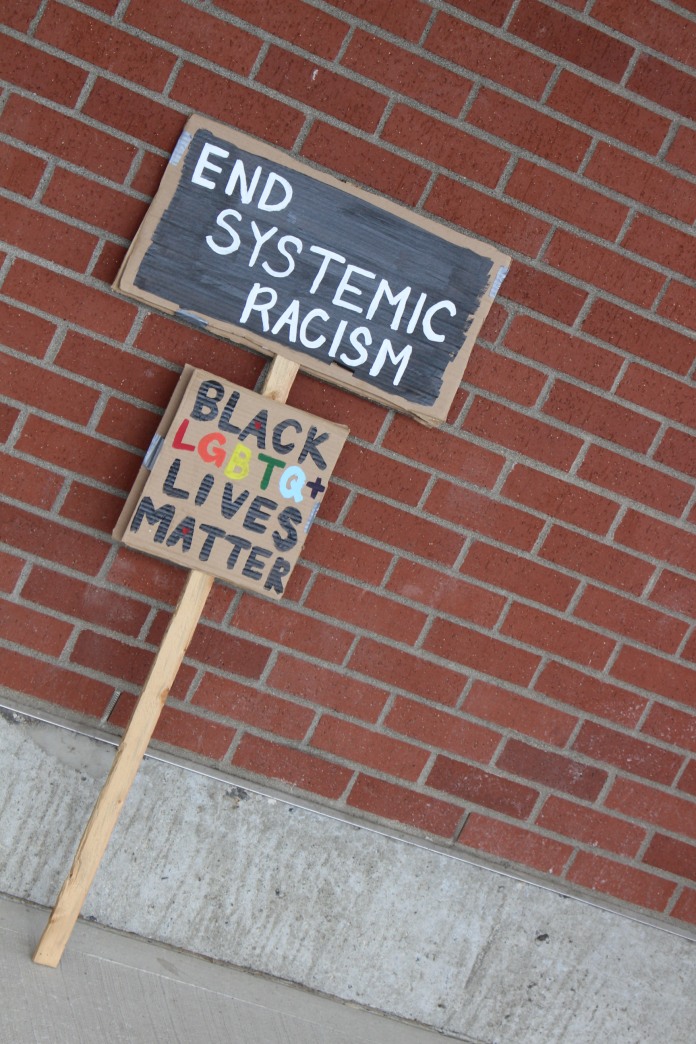
Citations & Credits
- “How Did We Get Here? Let’s Look at History to See the Missed Opportunity…” by Michael Adams.
- Thank you to Jennifer Adams for video-recording much of March on Snohomish/Sign Wave: Gathering of Peace’s dialogue and speeches.
- Juneteenth, Wikipedia.
- “History of Juneteenth”, Juneteenth.com.
Resources:
- Change the Narrative: Granite Falls; Administrators and moderators: Michael Masaki Clark, Michael Adams, Maurice Barnes, Amy Salins-Myers, Princess Nayeli, Katie Ort, Kelly Heather, Cole Sims, Kate Elizabeth, Jeff Olson, and Jen Kim.
- Mayor John Kartak
- John Lovick, Representative, 44th Legislative District
- Interim Chief of Police Robert D. Palmer

